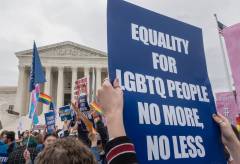
Bostock v. Clayton County, GA / Zarda v. Altitude Express / RG & GR Harris Funeral Homes Inc v. EEOC
On June 15, 2020, the Supreme Court issued a landmark decision approving the analysis Lambda Legal has been advancing for fifteen years that discrimination based on gender identity or sexual orientation is sex discrimination, and violates the Civil Rights Act of 1964. This federal law, which often is referred to as “Title VII,” prohibits employers from discriminating against employees on the basis of sex, race, color, national origin and religion.
Read moreThe Supreme Court’s decision came in three cases that were considered together:
- Bostock v. Clayton County, where the U.S. Court of Appeals for the Eleventh Circuit ruled against Gerald Bostock, a Clayton County, Georgia, child welfare services coordinator fired when his employer discovered he was gay.
- Altitude Express v. Zarda, a New York case where the U.S. Court of Appeals for the Second Circuit ruled in favor of the estate of Don Zarda, a skydiving instructor who was fired because he said he was gay.
- R.G. & G.R. Harris Funeral Homes v. EEOC, a Michigan case brought by the EEOC and then the ACLU where the U.S. Court of Appeals for the Sixth Circuit ruled in favor of Aimee Stephens, a transgender woman fired from her job as a funeral home director when she informed her boss she intended to transition.
Lambda Legal filed friend-of-the-court briefs in all three cases in the Supreme Court, and argued the Zarda v. Altitude Express case before the full Second Circuit in September 2017. Lambda Legal also filed friend-of-the-court briefs in the circuit courts in the New York and Michigan cases.
The Supreme Court’s decision in Bostock cemented the trend in recent years of courts recognizing that the federal law prohibiting sex discrimination also reaches claims of discrimination based on sexual orientation and gender identity. The pro-coverage argument had been accepted by every court willing to entertain it, but there were still some courts that stubbornly refused to consider it based on existing precedent in their particular circuit. The Supreme Court swept away all the contrary precedent and protected all LGBT workers nationwide.
Lambda Legal has been at the center of this work for years, not only filing briefs in these three cases at the Supreme Court in 2019 but also securing a victory on behalf of Kim Hively in 2017 in the landmark Hively v. Ivy Tech Community College case before the full Seventh Circuit — the first federal Court of Appeals to rule that workplace discrimination based on sexual orientation violates federal civil rights law. Lambda Legal then argued as amicus in Zarda v. Altitude Express before the full Second Circuit, which agreed with our analysis, followed Hively, and became the second federal circuit to adopt this approach. Lambda Legal had followed the exact same procedure in 2017 on behalf of Jameka Evans, but the Supreme Court declined to hear her appeal, and decided in April 2019 to take Mr. Bostock’s virtually identical 2018 appeal. Lambda Legal further won a landmark victory in 2011 on behalf of Vandy Beth Glenn, a Georgia state employee who was fired for being transgender in Glenn v. Brumby, in the Eleventh Circuit. Three of Lambda Legal’s successful efforts in 2014, in federal courts in Seattle, Chicago, and Washington D.C., were cited by the EEOC in 2015 in its Baldwin v. Foxx ruling, which adopted our position that Title VII forbids anti-LGBT discrimination, which the Supreme Court has now adopted as the law of the land.
Click here to learn more about Lambda Legal’s work on employment protections.


